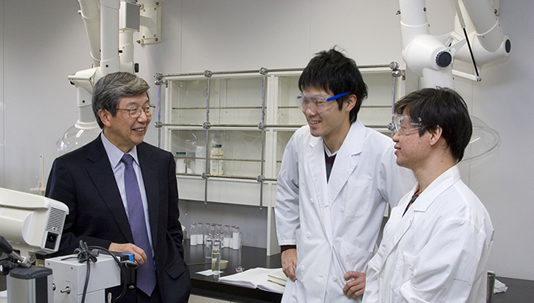The master's course of the Postgraduate School
Features of special studies of applied chemistry at the Postgraduate School of Kanagawa University, Graduate School of Engineering

The master's course of the Postgraduate School of Kanagawa University was established in April 1967, and the doctor's course was established in April 1990. By the academic year of 1998, 251 students had completed the two- year master's course and received master's degrees, nine of these continued on to the doctor's course and five received a doctor's degree in engineering and two became Ph. D. All of the graduates of the postgraduate school are actively involved in research, development, education or business.
Students of the Department of Material & Life Chemistry are divided into three courses, Resources, Energy and the Environment, Structural and Functional Materials and Biomolecular Engineering, in the third year. The courses are designed for students with the objective of imparting guidance capability as research engineers by developing the ability to carry out creative work in the field of applied chemistry based on the knowledge gained in the specialized fields. In order to achieve this objective more effectively, the Postgraduate School of Kanagawa University offers lectures and seminars related to molecular property engineering, energy conversion chemistry, functional polymeric materials, biomolecular engineering, inorganic materials and analytical chemistry and resource materials chemistry, which are advanced study subjects of the three courses of the Department of Material & Life Chemistry. The postgraduate courses are designed to provide a wide range of education so that the students who complete the courses are capable of participating in interdisciplinary research.
The following is an introduction to research carried out at the Postgraduate School of Kanagawa University categorized according to field.
Field of molecular property engineering
- Determining the mechanism of catalytic reactions occurring on the surfaces of solids and metal complexes. Development of new and highly efficient catalysts in order to solve environmental and energy problems.
- Controlling the reactivity of organic compounds using enzymes and enzyme-like reaction environment. Development of new types of organic photochemical reactions and determining their mechanisms. Synthesis and characterization of functional supramolecules.
- Interactions of peptides and DNA residues with transition metal ions. Molecular recognition with self-assembly of complexes. Molecular electronics materials and liquid crystalline features and thermochromism of complexes.
Field of energy conversion chemistry
- Determining the mechanisms of electrochemical reactions. Development of high-energy density secondary battery materials and functional plating.
- Decomposition of toxic organics using photocatalysts. Development of biosensors.
Field of polymeric functional material
- Development of functional polymeric materials such as photo-functional polymers and polymeric catalysts.
- Search for new synthetic organic reactions and their application to polymer reactions.
- Synthesis of functional materials based on synthetic organic chemistry and searching for new reactions to prepare them.
Field of biomolecular engineering
- Composition of all peptide antibiotics with more than one unusual amino acid.
- Modification of peptides and proteins. Preparing functional artificial peptides.
- Chiral synthesis of biologically active natural products based on carbohydrate chemistry.
- Preparing antigenic oligosaccharide chain.
Field of inorganic materials and analytical chemistry
- Acid deposition via rain, mist and dew.
- Development of new membrane separation methods and microanalysis methods.
- New solid electrolytes and their application.
- New ceramic materials with membrane function and photo-function, etc.
Field of resource materials chemistry
- Development of new polymeric materials with excellent efficiency and variety of functions and their use.
- Development of new thermal analysis methods for research of high polymer chemistry and the establishment of applied fields for the methods.

